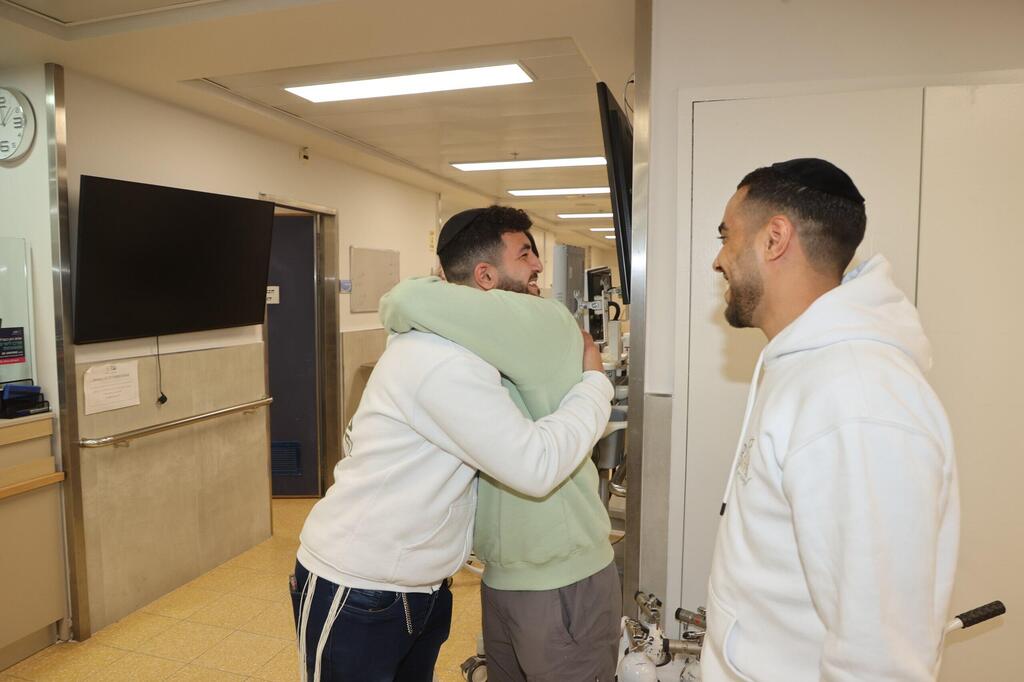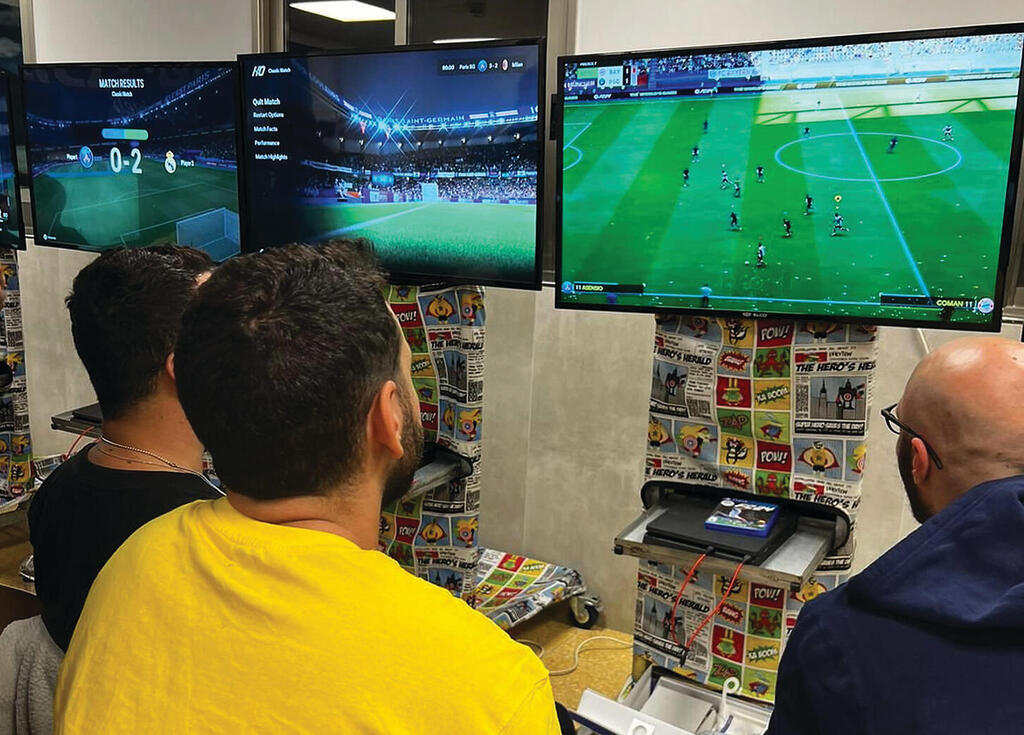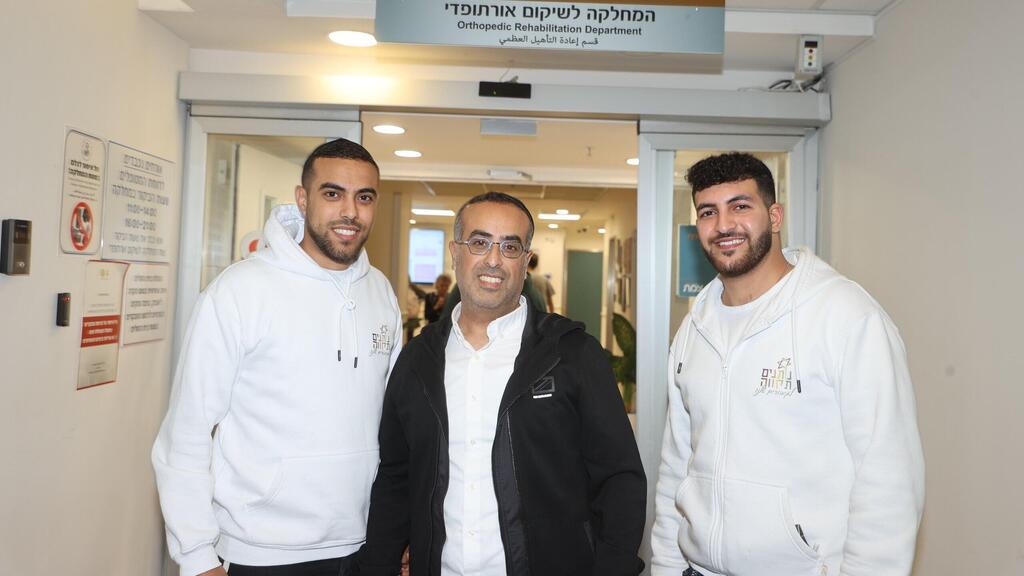Getting your Trinity Audio player ready...
On a bench in the orthopedic rehabilitation department at Sheba Medical Center, it is nearly impossible to have a conversation with Shmuel Moshe. Each sentence is interrupted by either a patient reaching out to shake his hand or a medical staff member asking about his well-being. For Shmuel, this is actually comfortable. He prefers to talk as little as possible about what he does.
Read more:
"Aside from the medical treatment of the patients, I make sure to respect the privacy of the families," he explains. "No one needs to know the problems of others. Behind every wounded soldier, there is a family that may be falling apart."
Shmuel, a 44-year-old resident of Petah Tikva, is married to Devora and a father of five. He has been managing the Notnim Tikva (Giving Hope) association for 20 years, which includes a system of volunteers and national service girls who provide assistance in the pediatric departments at the Edmond and Lily Safra Children's Hospital.
Among other things, the association helps raise funds for life-saving medications and supports the families of patients who have encountered financial difficulties. The volunteers lead activities such as workshops and performances at the hospital, and the flagship project of the association is a music and media center with musical instruments and a recording studio.
When the war broke out, Shmuel decided to expand the association's activities for the wounded soldiers admitted to the hospital, and that's how Yehonatan, his 22-year-old son, joined the picture. "He quickly got involved and became the joker of the department," says the proud father, mentioning some of the association's activities, including a football tournament they organized. "We also provided adaptations for participants with one hand," adds Jonathan. Three months ago, when he was with the wounded at Sheba, his first daughter, Adi, was born. "It's all thanks to my wife, Hadar, who understands the importance of our work," he says.
"Shmuel is an angel," testifies Shalom Shitrit, 20, a Golani soldier who was injured in battle and lost his leg. "I met him and Jonathan when I arrived here, and I saw how they reach out to every wounded soldier, to every family, all in silence and modesty. My family went through turmoil. It's not an easy situation."
"In the meantime, we have become a family here, the volunteers and the wounded," says Yehonatan. "We listen to them, help in any way we can, and when we can't, we connect with others. I'm not someone who cries, but I've sat with wounded soldiers several times, hugged them, and cried together."
Walking down the hallway, Yehonatan stops for a hug between Asif Avrahami, a captain with the Egoz Special Forces unit, who was injured in a grenade explosion and is expected to be released the next day, and volunteer Moshe Oshmi.
"These volunteers represent the beautiful side of Israel, giving wholeheartedly," says Avrahami. "I was able to share with them about the intense fighting in the strip. I found a listening ear in them, and it greatly helped me." Oshmi, 21, was the first volunteer to join Yehonatan in the rehabilitation department. "The wounded soldiers saved our home. We owe them everything," he explains.
Amit Alon, 20, a Givati soldier who was injured three weeks after the outbreak of the war, shares this feeling. "I was the first injured from my unit," he says. "The initial connection with Yehonatan was through my father. He saw on Yehonatan's face that he was in distress and helped my parents with whatever they needed. For me, Yehonatan is not just a representative of an association, he's a friend."
His brother, Maor, a Givati soldier who was called up for reserve duty, adds that the presence of the volunteers eased his mind when he returned to fight in the strip. "I knew they were taking care of my brother and helping him."
David Hay Ribayev, a combat photographer who was injured during an engineering corps operation in the strip, met Yehonatan in the intensive care unit when he came to visit the newly wounded. "We were ambushed by terrorists who fired RPGs at us," says David, the first combat photographer injured since the establishment of the IDF's Documentation and Photography Unit.
"This was my first battle. In the dilemma between shooting or filming, I mostly chose the camera. Yehonatan accompanied me from the moment I arrived, from when I was unconscious until now as I recover. He does everything wholeheartedly and is always there when needed." Sigal Levi, chairwoman of the "Notnim Tikvah" association, concluded: "I am filled with pride and gratitude to be part of such a blessed endeavor."





